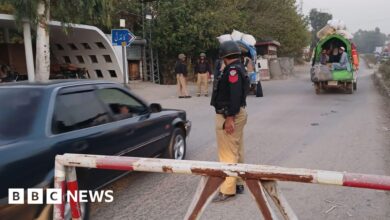UN Center Reaches Remote Pacific Islanders: UN Resident Coordinator Blog

“They don’t want to leave their ancestral place, even if they have to go down,” said Jaap van Hierden.

Jaap van Hierden, United Nations Resident Coordinator in Micronesia.
Appointed by the Secretary-General as the first United Nations Resident Coordinator for the North Pacific, he oversees ongoing development efforts on a remote region of thousands of small islands including The small population is the steward of a vast expanse of ocean and Earth stretching over 7,000 km from Palau to the island of Kiritimati.
He talked to UN News just before the Fourth International Conference on Small Island Developing States (SIDS4) is underway in the twin islands of Antigua and Barbuda in the Caribbean. He explained the United Nations Multinational Office, known as MCO Micronesia, where 13 UN agencies is now active, has been created.
“This largely undeveloped and relatively pristine region of the Pacific Ocean is not widely known. With the exception of Palau, these countries are not yet holiday destinations.
Aside from receiving some US funding, all five countries in the region – Palau, Federated States of Micronesia, Marshall Islands, Nauru and Kiribati – seem to be forgotten and left behind by the global community.
This raises the need for increasingly effective engagement by Micronesia’s leaders with the United Nations and its General Assembly, which in turn leads to a review of the United Nations’ multinational offices country and the subsequent establishment of my ministry.
The frontline of climate change
Upon arrival, I quickly learned that the people of Micronesia are on the front lines of climate change with the Marshall Islands and Kiribati at risk of disappearing beneath the ocean waves within the lifetimes of our children and grandchildren. Also facing similar existential risk are many of the low-lying islands outside Palau and Micronesia – with the four states of Yap, Chuuk, Pohnpei and Kosrae.

Workers build anti-erosion barriers along the Tuvalu coast.
The people of Micronesia are champions in our common fight against climate change and are leaders and advocates in highlighting the importance of considering vulnerability through through many aspects.
They have also contributed to the ongoing discussion on “loss and damage” to help them adapt effectively to rising sea levels and worsening weather events.
Encouragingly, they have fulfilled their responsibilities as stewards of our vast ocean through the establishment of marine protected areas as well as the United Nations Educational, Scientific and Cultural Organization. United Nations (UNESCO) World Heritage Sites and Biosphere Reserves and more.
Ocean stewards
However, Micronesians are very dispersed, numbering less than half a million, all living on small islands with small populations, who do not have the economic scale nor the skills and resources that we find found in countries or sub-regions of similar geographic scope.

Micronesians live on many small islands in the North Pacific Ocean.
However, as stewards of the ocean and its vast seabed, we cannot leave them vulnerable, and I am delighted that the United Nations is increasing its engagement in Micronesia to ensure that no one left behind and ensure we help build a better future for everyone.
‘Expanding the United Nations’ footprint’
We quickly learned that our islands are very small, with our sub-regional host, Pohnpei, having only about 30,000 people on the island and many having left to study or work in the United States.
However, we persevered and were able to establish a fully operational United Nations Micronesia MCO within two years of arriving in Pohnpei at the end of 2021. National coordination offices have now been established. established in Palau, Marshall Islands, Nauru and Kiribati, and a fully functioning Resident Coordination Office has been established.
The new office enabled United Nations organizations to begin decentralizing their work from Fiji and Samoa to Pohnpei. That led to the expansion of the United Nations presence in Pohnpei from 2021 to 13 today.
‘Being on the ground makes a huge difference’
In parallel, I worked closely with the governments of Micronesia and Pohnpei in setting the stage for the design and construction of a carbon-neutral One UN Micronesia House, incorporating Micronesian history and culture into the design and landscape its view.
The commitment to include a conference facility will help us bring more United Nations-convened events to Micronesia and enable Micronesian leaders to engage with international leaders and experts in their hometown. We have made good progress with the land allocated by the Pohnpei State Legislature and the final design and construction kick-off ceremony will be held soon.

Children pose on the steps of a building in Micronesia.
Not surprisingly, being on the ground makes a big difference in assessing and understanding the humanitarian and development challenges and opportunities in each of Micronesia’s five countries and its four states. Micronesia. To communicate this effectively within our UN team, I regularly travel and interact with government partners, embassies, development partners, civil society, leaders faith-based, chamber of commerce and community.
Together, we aspire for transformational change that leaves no one behind and helps a better future for everyone, one that supports our planet with its natural resources. Finite and unique biodiversity is a key stakeholder.”
United Nations Resident Coordinator
- The United Nations Resident Coordinator, sometimes known as the RC, is the highest-ranking representative of the United Nations development system at the country level.
-
In this occasional series, UN News invites RCs to blog about issues important to the UN and the country in which they serve.
Learn more about the United Nations’ work in Micronesia This.




